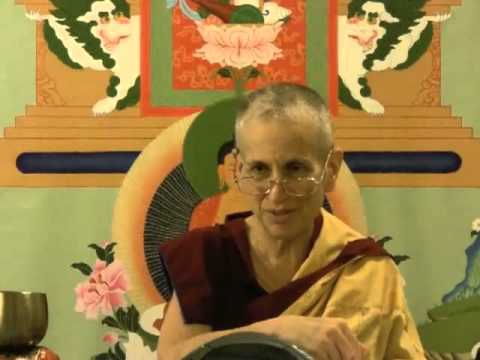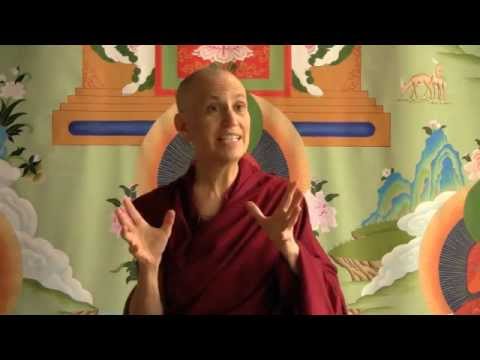The meaning of the Tara mantras
This talk was given during the White Tara Winter Retreat at Sravasti Abbey.
White Tara Retreat 22: Meaning of the mantras (download)
We were at the place where all the light and nectar is coming down and flowing through you—and you feel completely blissful. When you imagine the light and nectar coming down, it isn’t that you have to imagine a constant movement in your body. That can be quite disturbing if you do that. Rather that you’re just filled with the light and nectar that continues to come in. You really feel very pure and clear inside, that’s what you want to contemplate on.
While you are doing the visualization then you also say the mantra. Now some people find it difficult to say the mantra at the same time as they do the visualization. What you can do is start out doing the visualization for a little while. Then add the mantra. When you’re doing both the mantra and the visualization, don’t try to equally pay attention to both because you can’t do that. You might pay attention to the visualization and then the mantra is in the background. Or you might pay attention to the mantra and focus on that. In that case, you’re aware of the visualization but it’s not the foreground thing because your mind is mostly focused on the mantra. If you’re trying to do both of them very attentively at the same time you’re going to get pretty exhausted. You can focus on one or the other.
Meaning of the mantra
Some people were asking about the meaning of the mantra. We have two mantras here. We have the general Tara mantra: om tare tuttare ture soha. The whole word Tara means liberator. That’s what her name means.
We have three derivatives of that: om, which refers to the Buddha’s body, speech and mind because it has those three sounds: om, ah, um. That’s the Buddha’s body, speech and mind. Then, tare tuttare ture, so there are three things that we’re liberated from. tare liberates from samsara by removing the afflictive obscurations: the afflictions, their seeds, and the karma that cause rebirth. Tuttare counteracts the eight dangers and I’ll talk about those later. They are eight specific inner afflictions that correspond with eight external dangers. They’re listed in the book How to Free Your Mind: Tara the Liberator. I’ll go over those in the future. Then ture is freeing from all disease. While you’re saying the mantra you’re thinking of being freed from all of those three things. When we’re talking about disease, of course it can be physical disease but the biggest illness is our afflictions. Then soha means: “may this all come about,” or “may this take root.” You can also think about the meaning of the mantra when you’re saying it and feel liberated: from samsara, from the eight dangers, and from all illness.
We also have the increasing mantra: om tare tuttare ture mama ayur punye jnana pushtim kuru soha, and that is for increasing our life, our merit, and our wisdom. Om is the same: the Buddha’s body, speech, and mind. Tare is freeing from samsara; tuttare is freeing from the eight dangers; ture is freeing from illness. Mama means myself, so here you’re doing it to increase your own lifespan, merit and wisdom. If you’re doing it for your teacher instead of mama you would say guru: om tare tuttare ture guru ayur punye jnana pushtim kuru soha. I do that for my teachers every day. So you would have mama, meaning yourself; ayur is lifespan; punye is merit; jnana is wisdom; and then pushtim is increase. Again, kuru soha: may this come about.
You can think about the meaning of that mantra while you’re saying it. Really feel like your lifespan is increasing. We’re increasing your karmic lifespan and especially removing any kind of karma that would cause untimely death. Also, we’re increasing our merit so that we can have a longer lifespan. They say that death comes about either because: (1) the karmicly given lifespan that was with us when we were born either that has run out or we have an untimely karma that ripens. Or, (2) we run out of merit.
Punye is increasing our merit, not just the merit to have a long life, because that’s just this lifetime. The reason we want a long life, by the way, isn’t just because we don’t want to die—it’s because we want to practice the Dharma. Everybody doesn’t want to die, but we should have a better motivation than that: it’s for doing our Dharma practice. So punye means increasing our merit—because to gain realizations we need a lot of merit.
Jnana is wisdom—the collection of merit, the collection of wisdom. We need both of those. And then, “may they increase.”
You can contemplate that those three are increasing (lifespan, merit, and wisdom). This of course leads you into a contemplation of what else besides saying this mantra can I do so that my lifespan, merit, and wisdom increase. Well, lifespan, okay, take good care of our selves. But how do we increase our merit? We do this through the practice of generosity, keeping good ethical discipline, practicing patience, doing all sorts of different meritorious actions: prostrating, making offerings, and so on. How do we increase our wisdom? By learning the scriptures, thinking about what we’ve learned, reflecting on it, and then meditating on it, as well as putting it into practice in our daily life.
You can think about the meaning of the mantras. Then that should lead you into a reflection of what else can I do to increase these three qualities—which are very important for gaining realizations and being of benefit to all sentient beings.
Venerable Thubten Chodron
Venerable Chodron emphasizes the practical application of Buddha’s teachings in our daily lives and is especially skilled at explaining them in ways easily understood and practiced by Westerners. She is well known for her warm, humorous, and lucid teachings. She was ordained as a Buddhist nun in 1977 by Kyabje Ling Rinpoche in Dharamsala, India, and in 1986 she received bhikshuni (full) ordination in Taiwan. Read her full bio.


